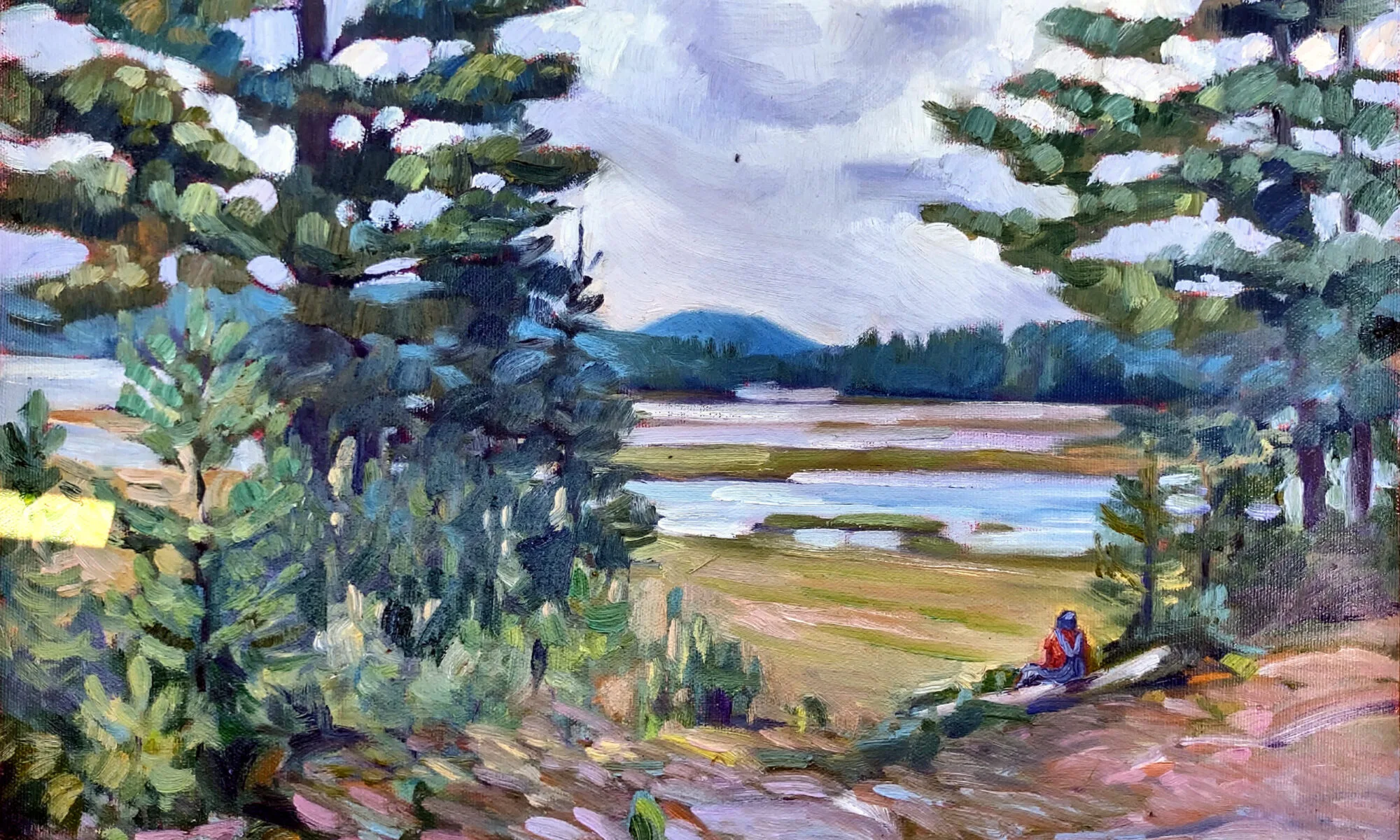Nobody’s around and you want to paint. Find the owner, ask for permission, or just don’t do it.
| The Dugs in Autumn, by Carol L. Douglas, was painted from the shoulder of a public road. |
We don’t have air conditioning here. On the most torrid of coastal Maine nights we might run a box fan. This morning I woke shivering and ran to my closet for my fluffy robe. It’s 40° F, with an expected high of 62°. This is the start of sweater weather, and it’s the maddest, gladdest season of the whole year. It’s my favorite season to paint, and I will be heading out as soon as I finish this.
Last year I followed autumn across the continent from Alaska to Labrador. It’s very different in the west, where the gold aspens flame across the dark spruces. Here in the northeast, we have a more conventional show of reds and golds against the greens. That’s because we live in a hardwood forest.
Yesterday I went out exploring with Bobbi Heath. She showed me a nature preserve in my own back yard. This is Fernalds Neck, which juts out into Megunticook Lakein Camden. I’d been down the road, since a friend lives there, but didn’t realize it continued on past her house. I’m cautious about trespassing, as a general rule.
| Rockport Autumn Afternoon, by Carol L. Douglas, was painted on private property, with permission. |
The red (or swamp) maples were starting their show of brilliant crimson, but that’s not where we will head today. Instead, we’re aiming for the St. George Peninsula. Yesterday we scoped out a footbridge, a dinghy, and some slow-rolling waves, the last remnants of hurricane.
Some of these require standing on private property. We asked for permission at the places that interested us. Part of our job is to be ambassadors for plein air painting. That means respecting private property rights.
An artist is within his or her rights to paint from the shoulder of the road. However, boathouses, lawns and businesses are private property. So are the inviting water meadows that stretch out from the road. That ‘million dollar view’ may, in fact, be a commercial investment of a great deal of money. It looks unoccupied and poetic to you, but those heaps of buoys, pot-warp and traps are part of the owners’ livelihood, and they don’t want you messing around with them.
| Wabash bottom lands, by Carol L. Douglas, was painted on private property with permission. |
A few years ago, Bobbi and I set up on a roadside in Port Clyde, near an unassuming garage. While we were there, several other painters bushwacked behind the garage to paint. The owner showed up. He was rightfully enraged by the encroachment. Since we were on the road, we caught the brunt of his anger.
I’ve asked for permission to paint hundreds of times. I’ve been told ‘no’ many times. Usually it’s because the owner is chary of a lawsuit. In Indiana, I once set up along a swampy road along the Wabash River. A local warned me off. “There’s a meth house down there,” he told me.
Sadly, that’s a more common danger in modern America than wild animals. In rural New York, I set up on a roadside to paint a bucolic barn scene. A woman came out of her house and asked what I was doing. I explained and asked her, as a courtesy, if she minded. “I sure do,” she snapped. In that case, you should just leave.
 |
| Cattle, Sweets Corners Road, by Carol L. Douglas, was painted from the road side of an electric fence. |
Of course, you should also respect fences. Cows and horses are pretty, but they can also be territorial, and you have no business being inside their enclosures.
Having said that, most people like artists and are curious about what we’re doing. In fact, most of my easel sales have been unexpected purchases by property owners who stopped by to look at my work.





